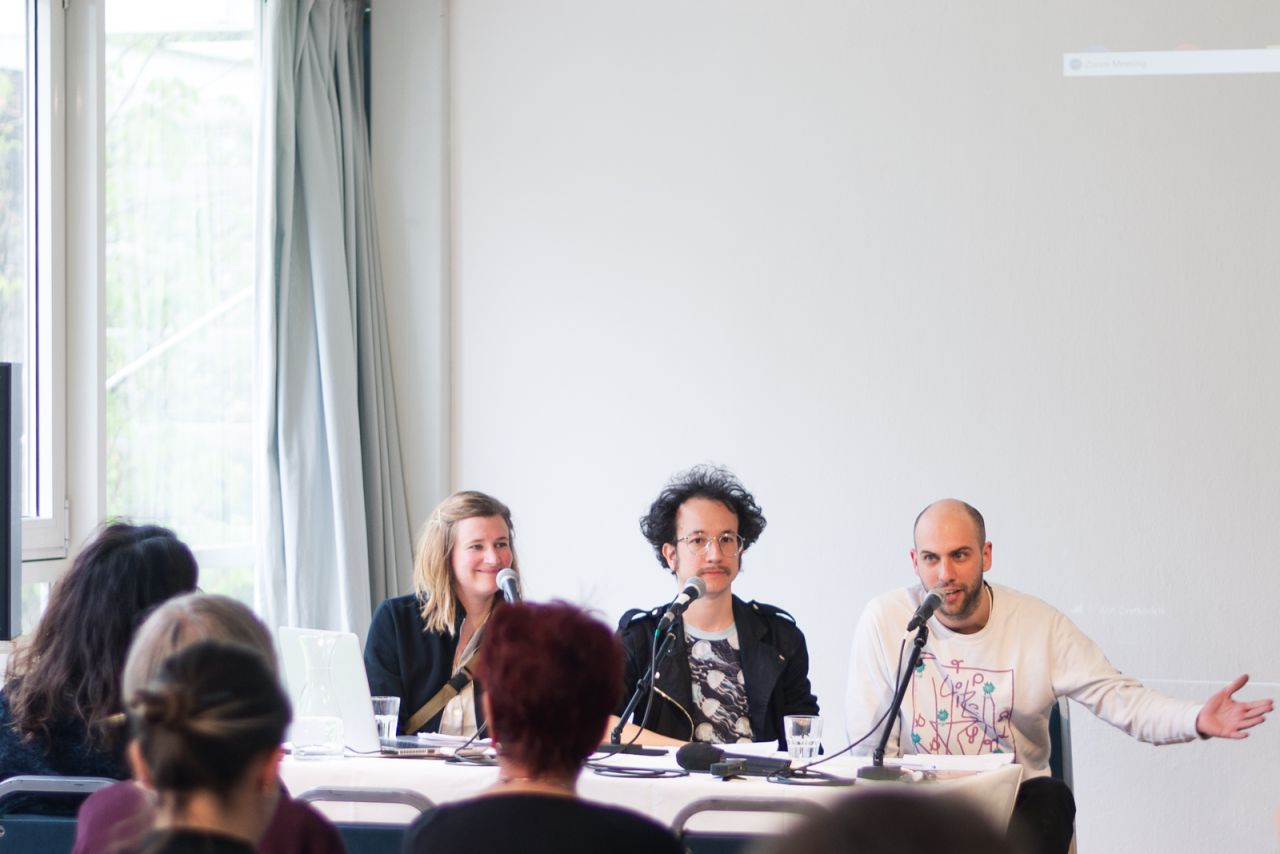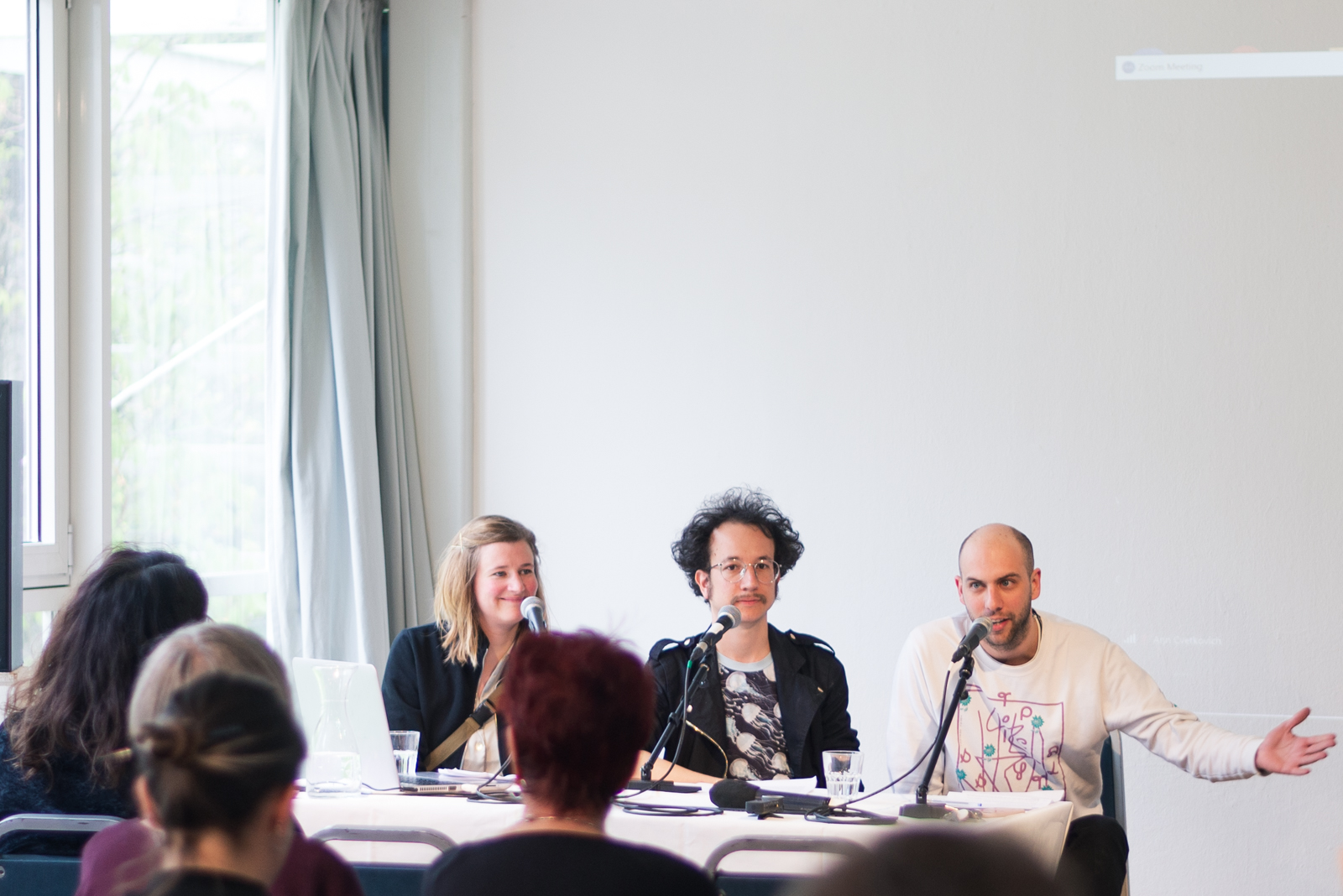Welcome to Festung Ohnmacht
Speech introducing FORUM STADTPARK’s yearly programme – Fortress Ohnmacht
By Markus Gönitzer, Robin Klengel, and Miriam Schmid
Part 1: Hello Ohnmacht
The German noun Ohnmacht has a very specific meaning. As far as we know, an equivalent expression does not exist in any other language. This is because Ohnmacht has two dimensions. On one hand, it refers quite literally to being ohne Macht (without power): a state in which power is absent or lacking. To take the corresponding adjective, a person who is ohnmächtig is a powerless person, someone with no influence over events around them. However, Ohnmacht is by no means a neutral state, but describes a forced situation. Those who suffer from this condition are condemned to the position of a spectator, locked into inactive paralysis as the drama of world events unfolds before their eyes. However, Ohnmacht – and this is its second dimension – also refers to a lack of consciousness, a mental absence. An ohnmächtige person has fallen unconscious and lost their senses. Their connection to the here and now is broken. The unconscious person is not really present, and perhaps needs the help of others, to be woken up, to return to themselves. Being in a state of Ohnmacht appears to have something to do with dreaming. Or maybe it is simply a nightmare.
On a societal level, Ohnmacht arises when a certain state of affairs is no longer bearable, but change appears to be beyond reach. Between this absolute urgency and the need for transformation, a tortuous void opens, a hole or gulf that yawns ever-wider as the attendant crises continue to escalate. The situation becomes particularly unbearable when grievances seemingly cannot be addressed, and the task of resolving them is instead passed on to future generations – as is the case with the climate crisis. Suddenly, being in a state of Ohnmacht becomes unavoidably concrete and can no longer be denied. A sense of powerlessness that may well have been present all along, lurking in the corners, rapidly becomes an absolute fact. As Ohnmacht spreads out all around us, we are forced to look it in the face. And maybe that's the way it is supposed to be.
Part 2: Where Ohnmacht is produced
It is probably helpful to differentiate between Ohnmacht as a perceived state of being and Ohnmacht as a fact. Just like power itself, the power to act, which is the opposite of Ohnmacht, is very unevenly distributed in our society. A person’s ability to even partially determine the conditions of their own life is tightly coupled with their access to resources and the possibility (or impossibility) of democratic participation. Ohnmacht, it seems, is a more or less produced state. It is systemic, and as such, it is asymmetrically distributed.
Adorno speaks of a structural “imbalance between the power of the institution and the powerlessness of the individual”. The prison and the hospital, but also the school have all been developed as institutional machines designed to produce obedience. Even today, we generally think of institutions as structures that disempower, even when they are set up to pursue emancipatory goals.
Capitalism, too, produces Ohnmacht. This may sound unintuitive, particularly since capitalism so readily promotes terms such as self-initiative, innovation, or freedom. And yet the majority of people have no choice but to sell a significant part of their lifetime for work. In order to lead halfway decent lives, at least for a period, they must accept a state of powerlessness. Indeed workers without power – or ohnmächtige workers – are a very useful thing for capitalism. Given ample unemployment benefits or a guaranteed minimum income, people would not be ohnmächtig enough. The moment people no longer are forced to work in certain professions or branches, the demand to reduce capitalism’s power would gain traction.
Additionally, under capitalism, everyone is at the mercy of the market. The market predefines the rules of the game, rules which we (apparently) cannot influence. The politics of competition on a local and global scale create a relentless pressure to compete. The power of the invisible hand means that apparently, everybody’s “hands are tied”. Even entire states, it seems, cannot really do much to stem the tide. They might have a moderating effect, or perhaps provide a buffer, maybe even lower taxes a little – but even rent price controls are written off as being too utopian: “It would be nice, but it’s unfortunately just not possible.” Under capitalism, being collectively unable to act has become common sense.
In an interconnected world, Ohnmacht must be considered globally and relationally. Every form of oppression produces its own specific forms of Ohnmacht. Colonialism and neocolonialism produce Ohnmacht. Imperialism produces Ohnmacht. Ukraine, Yemen, Kurdistan, Iran: the intensity of the production of Ohnmacht is distributed so unevenly worldwide that, from the perspective of FORUM STADTPARK, it feels almost presumptuous to investigate it. Nonetheless, we plan to do precisely this, because in order to build global forms of solidarity prevailing relations must be shaken to the ground – both within and outside of Fortress Europe.
Part 3: Ohnmacht as a political feeling
The chains and walls that express and mediate Ohnmacht not only follow the borders between countries or continents. They are also constructed in our heads. Today, this is a “public” feeling. Everyone knows it – it is all-encompassing. Ohnmacht is experienced not just by the prisoner or the temporary worker, but by Rotary Club members, by visitors at the opening of the Steirischer Herbst festival, in the Hofburg Palace in Vienna, and probably in the Vatican, too. Even the most powerful seem not to be exempt from the fatalistic, nihilist emotional landscape produced by Ohnmacht. However, they have access to other ways to express and deal with their feelings. Today, the very rich, who believe that they can afford to give up on society and the world at large, build bunkers underground or in New Zealand to secure their futures: their very own private fortresses of Ohnmacht.
The more Ohnmacht is accepted as a given, the sweeter the promise that it might be overcome. Those who offer a believable path beyond Ohnmacht’s all-encompassing horizon are able to win hearts and minds. “Yes we can!” – certainly an enticing slogan, but one that only leads to disappointment if it is not accompanied by radicalism, courage, and the potential to deeply transform prevailing relations. To overlook this principle is fatal, because disappointment breeds more Ohnmacht, meaning that the cycle starts all over again.
Those who boldly set forth to defeat Ohnmacht are therefore well-advised to tread cautiously. All too often, their exhortations play into the hands of others seeking to capture and redirect the search for agency. Conspiracy theories thrive on the thrill of self-emancipation, while the esoteric industry has made the transcendence of Ohnmacht a lucrative business. Rightwing figureheads are bolstered by the narrative that only a “strongman” (or “strongwoman”) can take up the reigns of power. If care is not taken, Ohnmacht itself can be transformed into a fortress.
Part 4: Ohnmacht and political agency
Ohnmacht is not pretty. Nobody likes it, nobody wants to look it in the face, to perceive it as it is. This is most evident to those for whom the world’s future is (still) a matter of concern: those who want to change things, who pursue utopian visions, and who are willing to take their concerns to the streets – not only for themselves, but also in solidarity with others. The most engaged are also most sensitive to Ohnmacht’s seemingly all-encompassing power.
“You can’t change anything except yourself!” This is neoliberalism’s guiding principle, and it means that many of us encounter Ohnmacht alone. And it is while we are alone that Ohnmacht shows its most unassailable face. Acts of helplessness can be observed everywhere: cynicism and fatalism, the retreat to protected spaces, the attempt to reduce the damage just a little by changing individual consumer habits – to minimize complicity, at least on a personal level.
However, even those who collectively pit themselves against Ohnmacht are not spared. Ohnmacht tends to creep up during rare moments of inactivity or reflection. The wish to eliminate fear and worry through hyperactive overproduction is not only widespread under neoliberalism, but is also a part of our own experiences in the field of socially engaged art and activism. Being wary of a final overdose of Ohnmacht is not entirely unjustified, since it can indeed lead to long-term paralysis. However, routine – and the ritualisation of political action – can also mean that how we perceive our ability to act prevents us from sounding out the full depths of our actual political agency. Instead, depending on our political milieu, the same variable set of actions is repeated ad infinitum: one more demonstration, just another open letter, another rally, petition, Insta-story, but this time with a more convincing focus…
Part 5: Accepting Ohnmacht and its utopias
A question arises: if we were to take a moment and confront our own Ohnmacht, would this necessarily bring us to a standstill? Or might it instead lead to a shift in perspective? In our view, here, the word acceptance plays a central role – although acceptance should by no means be confused with resignation. Instead, acceptance means taking into consideration what we are capable of changing, and understanding the scale of our own actions. In recent years, FORUM STADTPARK has often called for courageous utopian thinking in order to ward off the rationalisation of our actions, and their reduction to simply “avoiding the greater evil”. However, projecting utopias on a grand scale can sometimes also intensify a sense of Ohnmacht. The aspiration to fight for a better, completely different world, or to fully transform oneself as a person, can in fact become overwhelming in light of the current dismal outlook and the seeming unattainability of such visions.
Following Alexander Neupert-Doppler’s Kairos philosophy, this is by no means a call to end utopian thinking, but rather to have a more courageous and lively debate about how to be effective, and what moment is best to act. Ohnmacht forces us to radically rethink our strategies, to forge new alliances, and to seek out unexpected levers and points of anchorage.
A first step in this direction is to take away the taboo placed on negative feelings such as mourning, rage, depression, and – precisely – Ohnmacht. Acceptance, in this sense, is not about doing nothing, but about preparing, strengthening our ties and our contexts, analysing political constellations, and allowing ourselves to be not sobered, but rather intoxicated by visions of a better future.
Part 6: Endings – and beginnings
Ohnmacht is “too big to ignore”. It is high time to declare it a public matter of concern, to research it, and to discuss it. Let’s look Ohnmacht in the face and give it a grilling. Perhaps, in the end, it won’t be our enemy. In the end, there’s no point in wasting our energy running away from it: we need our strength for other struggles, too. Maybe Ohnmacht will simply accompany us.
Welcome to FORUM STADTPARK. Welcome to Fortress Ohnmacht!

